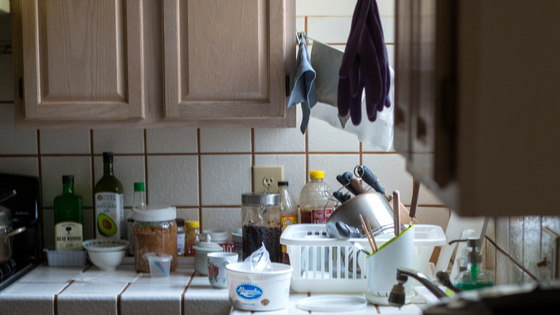On this website, some posts contain affiliate links, which means that if you buy a product using my link, I may earn a commission.
To get rid of pests in the kitchen, pour apple cider vinegar into a bowl, cover it with plastic wrap, and poke holes in it. Clean and scrub your kitchen regularly to eliminate infestations.
Keep your food containers tightly sealed, sink clean and empty, and eat at the table. Additionally, use a trash can and regularly clean up after meals. Practice excellent sanitation to eliminate pests’ access to food and water sources. The most common pests in the kitchen are ants, cockroaches, silverfish, and carpet beetles.
Pest-proof your kitchen by cleaning floor drains, sealing gaps around fixtures or pipes, and storing food in pest-proof containers. Avoid standing water, leaking pipes, and dripping faucets to prevent infestations in commercial kitchens.
Importance Of Kitchen Pest Control
Pests in the kitchen can pose serious risks to food safety and hygiene, as well as cause property damage. It is crucial to implement effective pest control measures to prevent these issues.
Food Safety and Hygiene: Pests such as ants, cockroaches, and beetles can contaminate food with their droppings, saliva, and body parts. This can result in foodborne illnesses and compromise the cleanliness of your kitchen.
Prevent Property Damage: Pests like silverfish and carpet beetles can cause damage to stored food, packaging, and even the structure of your kitchen. Regular pest control helps to safeguard your property and prevent costly repairs.
Avoid Health Risks: Pests carry bacteria, viruses, and parasites that can spread diseases to humans. This puts your family’s health at risk. By keeping pests under control, you reduce the chances of exposure to harmful pathogens.
To maintain a pest-free kitchen, it is essential to practice good sanitation, seal all food containers tightly, and promptly clean up spills and crumbs. Regular inspections and professional pest control services can also help in preventing infestations and ensuring a safe and clean kitchen environment.


Credit: www.aaipest.com
Common Kitchen Pests And Their Dangers
Learn how to keep your kitchen pest-free with these tips and tricks. From sealing food containers to maintaining cleanliness, you can prevent common kitchen pests like ants, cockroaches, and beetles from infesting your space. Take control of your kitchen and enjoy a pest-free environment.
| Common Kitchen Pests and Their Dangers |
|
Prevention And Maintenance Tips
Preventing pests in your kitchen is essential to maintain a clean and hygienic environment. By following a few simple tips, you can minimize the chances of a pest infestation:
- Seal all food containers tightly: Ensure that all food containers are properly sealed to prevent pests from accessing them.
- Regularly clean up right after meals: Promptly clean up any spills or crumbs after meals to eliminate potential food sources for pests.
- Wipe down surfaces and remove food debris: Regularly wipe down surfaces such as countertops, tables, and stovetops to remove food debris that may attract pests.
- Store pet food properly: Keep pet food in sealed containers and clean up any spills to avoid attracting pests.
- Keep garbage cans covered and empty regularly: Ensure that your garbage cans are covered tightly and emptied regularly to prevent pests from being attracted to the smells.
By implementing these prevention and maintenance tips, you can significantly reduce the risk of pests in your kitchen.
Natural Ways To Get Rid Of Kitchen Pests
| Kitchen Pest Control |
| Heading: Natural Ways to Get Rid of Kitchen Pests |
| Subheading: Use vinegar traps for fruit flies |
One natural way to get rid of fruit flies in your kitchen is to create vinegar traps. Simply pour a small amount of apple cider vinegar into a bowl or glass, cover it tightly with plastic wrap, and poke several small holes in the plastic. Fruit flies are attracted to the vinegar and will crawl through the holes, getting trapped inside. Another method you can try for crawling insects is sprinkling diatomaceous earth in areas where you see them. This natural powder is made from fossilized aquatic organisms and works by dehydrating and killing the pests.
Essential oils can also be used as pest repellents in the kitchen. Peppermint oil, for example, is effective at repelling ants and other insects. Simply dilute a few drops of the oil in water and spray it around areas where pests are present. Additionally, planting herbs such as basil, mint, and lavender can help deter pests as they dislike the strong scent of these herbs.
Lastly, maintaining a clean kitchen is essential for deterring pests. Regularly clean up after meals, wash dirty dishes, and wipe down all surfaces to remove any food residue that may attract pests. Keep food containers tightly sealed, sinks clean and empty, and eat at the table instead of allowing crumbs and spills to accumulate on the floor. By following these natural methods and maintaining a clean kitchen, you can effectively control and prevent pests in your kitchen.
Professional Pest Control Services For Kitchens
Our professional pest control services provide effective solutions for keeping kitchens free from pests. From eliminating pantry bugs to getting rid of flies, we use mechanical traps, bioremediation treatments, and other methods to ensure a pest-free environment. With our help, you can prevent pests from infesting your kitchen and maintain a clean and safe food preparation area.
|
Frequently Asked Questions Of Kitchen Pest Control
How Do You Pest Control A Kitchen?
To pest control a kitchen, follow these steps: 1. Clean and scrub your kitchen regularly. 2. Keep food containers tightly sealed and the sink clean. 3. Wipe up spills and crumbs promptly. 4. Seal cracks and gaps to eliminate entry points.
5. Practice excellent sanitation to deny pests access to food and water sources.
How Do I Get Rid Of Kitchen Pests?
To get rid of kitchen pests, follow these steps: 1. Keep your kitchen clean and scrubbed regularly. 2. Seal your food containers tightly. 3. Clean up spills and crumbs immediately. 4. Wipe down tables, countertops, and stove tops after meals. 5.
Repair any cracks, gaps, or leaks to eliminate entry points for pests. By practicing excellent sanitation and eliminating their access to food and water, you can keep pests out of your kitchen.
What Are Two Most Common Pest In The Kitchen?
The two most common pests in the kitchen are ants and cockroaches. They are attracted to food and can be found in cracks, crevices, and behind appliances and sinks. To prevent infestations, practice excellent sanitation and store food in pest-proof containers.
How Do I Pest Proof My Kitchen?
To pest-proof your kitchen, follow these steps: 1. Clean and scrub your kitchen regularly. 2. Keep food containers tightly sealed. 3. Maintain a clean sink and empty it regularly. 4. Eat at the table, not in the kitchen. 5. Use a trash can with a lid.
By practicing good sanitation and eliminating access to food and water sources, you can prevent kitchen pests like ants, cockroaches, and beetles.
Conclusion
To keep your kitchen pest-free, it is vital to practice excellent sanitation and take preventive measures. Clean up immediately after meals, wash dirty dishes, and wipe down surfaces regularly. Ensure that food containers are tightly sealed, the sink is clean and empty, and meals are consumed at the table.
Use a trash can to dispose of waste properly. Additionally, eliminate any standing water, repair leaks, and seal gaps to prevent pests from entering. By following these steps, you can maintain a pest-free and hygienic kitchen environment.
On this website, some posts contain affiliate links, which means that if you buy a product using my link, I may earn a commission.

